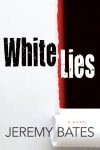White Lies by Jeremy Bates
 By J.N. Duncan
By J.N. Duncan
 I’d like to welcome Jeremy Bates to the ITW list of authors with his debut thriller, WHITE LIES, a knock-out, twisty story about the trouble caused by one, little white lie. Degreed in English Literature and Philosophy, Jeremy has traveled the world and taken up residence in half a dozen different countries, but the broad scope of his life doesn’t keep him from focusing in on small, normal places, where equally normal people can find themselves involved in big-time terror. Welcome, Jeremy! Let’s get to the good stuff.
I’d like to welcome Jeremy Bates to the ITW list of authors with his debut thriller, WHITE LIES, a knock-out, twisty story about the trouble caused by one, little white lie. Degreed in English Literature and Philosophy, Jeremy has traveled the world and taken up residence in half a dozen different countries, but the broad scope of his life doesn’t keep him from focusing in on small, normal places, where equally normal people can find themselves involved in big-time terror. Welcome, Jeremy! Let’s get to the good stuff.
First off, why don’t you give us the Twitter summary, a one sentence blurb of your story, WHITE LIES.
When a woman tells a white lie, she is forced into telling another and another until soon her life, and the lives of those close to her, are in jeopardy.
Your story arises from an ordinary person encountering a fairly normal event that spins out of control. What was the inspiration for your plot?
Scott Smith’s A SIMPLE PLAN was part of it. I’m a big fan of authors who start off with a simple premise and let things get more and more tangled, rather than those who start off with something complex and try to juggle all the balls from the get-go. I really liked Smith’s premise: What if someone found four million dollars? What would he or she do? What would you do? The same thing goes for WHITE LIES. What if someone told a white lie and was forced into telling another and another? How far would she take it? How far would you?
Working with ordinary people, in this case, a teacher, and building from rather innocuous events is, I believe, both intriguing and challenging within the thriller genre. What did you find most challenging and rewarding building a story from this starting point?
I actually find it less challenging to work with ordinary characters and innocuous events. To write about a CIA agent or whomever saving the world, you need to know a heck of a lot about CIA agents and shadowy governments etc. Ordinary characters can be anyone, which I find to be very refreshing. It gives you freedom with each book to write something different, to get into a completely different mindset. And I don’t think the protagonist needs to be larger than life to be interesting. As long as the character is fleshed out, and has some sort of internal and external conflict, he or she should pull the reader in. Concerning what I find the most rewarding, I’d say when you get to the point in the novel when your characters take on a life of their own and you, as the author, almost become part of the audience. Same goes for the plot. When it takes a twist you never anticipated. That’s always a good feeling.
This is your debut novel. Can you give us a bird’s eye view of the time frame and process you went through to get from story idea to publication?
It took about eight months to complete the first draft of WHITE LIES. During the following six months or so, I was in constant touch with my editor. I also had a couple conference calls with the wonderful team at Oceanview Publishing. One was to brainstorm ideas for the book cover. Another was to discuss marketing strategies. During the final six months before publication, I was in close contact with the marketing and publicity manager, who kept me up to date with the reviews that were coming in, interviews, and so forth.
What authors provide you with writing inspiration? Is there one in particular that always makes you say, “I want to be that good.”
Every author inspires me to some degree. Both authors I don’t particularly enjoy because I think “I can do better than that,” and authors I really like because I think “I want to write something like that.” One author that makes me say “I want to be that good” is Stephen King. Unfortunately that will never be! But it’s the truth. Whenever I read one of his stories, I’m always thoroughly impressed by his creative talent.
Having been a debut author myself, what are you finding the most daunting and rewarding aspects of being a newly published author?
I’ve found the most daunting aspect to be the whole social media aspect. I’ve pretty much gone from 0-60 over the past several months. It’s been great learning experience but also overwhelming because there’s just so much to keep on top of, especially while keeping down a job and writing another novel. Most rewarding would also be the whole social media aspect! Seriously. Getting a website up and running was really neat. Getting involved in Twitter, Facebook, Goodreads, writing organizations, etc. has also been a lot of fun.
We all have favorite parts of the stories we write. What was your favorite part of WHITE LIES? Do you have a favorite quote or line from the story?
Probably the middle climax. Katrina has reluctantly agreed to help Jack cover up the murder. They get rid of the body. They think they’ve pulled it off. Then—bam. They realize they made a mistake and have to go back and change something. The initial murder leads to another. That’s when they cross the point of no turning back and things really begin to spiral out of control. My favorite quote would likely be when Jack goes to Zach’s house—someone who witnessed the murder—to shake him down and he says: “If I had wanted to beat you up last night, you wouldn’t be standing today. You wouldn’t even be sitting. You’d be lying in a hospital bed begging the doctor for more morphine because you hurt so bad.” I like it because it’s something I would never say. I guess it goes back to what I mentioned earlier about the most rewarding part of writing: when characters take on their own life.
Writing good villains is an art as much as creating a great protagonist in a thriller. How do you go about creating a “likeable” villain and what makes them so?
I think you have to keep them real. I don’t like villains who always smile when they do something evil, or villains who throw kittens in front of buses just to be evil. Real people—unless they are genuine sociopaths, and not always then—simply don’t act like that. So I try to make my villains do bad things because of the circumstances they find themselves in, not because they are born villains, so to speak.
You’ve traveled around the world a bit. Has this ability to see other cultures and people from different walks of life informed your writing in any way?
If I wrote a story based in Japan or the Philippines or wherever, then, yes, probably. Because, by extension of the setting, I would inevitably be writing about those cultures and peoples. However, most of what I’ve written—and am writing—takes place in the U.S. Most of my characters are American. So, no, I wouldn’t say living abroad has informed my writing all that much.
If WHITE LIES was made into a movie, who would you cast in the main character’s roles?
For Katrina I have no idea. Someone who physically resembles what she looks like in the novel, which would be a blonde, blue-eyed, thirtyish woman. There are a lot of actresses in Hollywood who could fill that role! When I was creating Jack, however, an actor named Richard Tyson popped into my head. He was the main villain in 1990’s KINDERGARTEN COP. This would not be a realistic choice, because the actor is about fifty now. But whenever I think of Jack, I always picture this guy.
Thrillers cover such a broad swath of the reading landscape. What do you feel WHITE LIES brings to the table that readers may not have found elsewhere?
I’d say the fact Katrina makes very bad choices. There are a lot of perfect protagonists out there. There are a lot of gritty ones too. But even the gritty ones usually make the right calls, do the right things. Katrina, on the other hand, doesn’t. She’s a good woman at heart, which keeps her sympathetic, but she gets caught up in a series of lies which she keeps feeding with more lies. This is something a little different, I believe.
And as a debut writer, if you were to give any bits of advice to those still struggling to achieve their dreams, what would you like to tell them?
I’ve heard this so many times, and I know aspiring writers have no doubt heard it too, but it’s too true not to repeat: read and write. Reading work similar to what you write is a great way to learn about style, voice, plotting, etc. And writing every day is by far the best way—if not the only way—to improve your craft. You can’t become a doctor without ever practicing medicine. Similarly, you can’t become an author without ever writing.
If your book were to be shelved with similar titles, who would you like to see your book sitting with?
Any titles by Jason Starr or Kevin O’Brien. I mention these guys not only because I like their work, but also because Starr’s protagonists are flawed and do bad things, and O’Brien writes suspense fiction about ordinary people, not cops or special agents, who must solve the mystery, or get themselves out of bad situations.
What would you like to say to readers who may be pondering picking up your book right now?
If the blurb appeals to you, give it a shot! If not, check out my website, where you can learn a little bit more about me or the book and take it from there.
Thank you, Jeremy, for taking the time to answer my questions. Being a fan of normal people put into extraordinary events, I’m intrigued and will be checking out your book. Best of luck to you!
*****
 Jeremy Bates has spent the last ten years traveling the world, visiting more than thirty countries. He has lived in Canada, the United States, Australia, Japan, South Korea, and the Philippines. WHITE LIES is his debut novel.
Jeremy Bates has spent the last ten years traveling the world, visiting more than thirty countries. He has lived in Canada, the United States, Australia, Japan, South Korea, and the Philippines. WHITE LIES is his debut novel.
You can find out more about Jeremy and WHITE LIES at his website.
- Helsinki Homicide: Darling by Jarkko Sipila - September 30, 2014
- Turnbull House by Jess Faraday - January 31, 2014
- Twist by John Lutz - September 30, 2013
